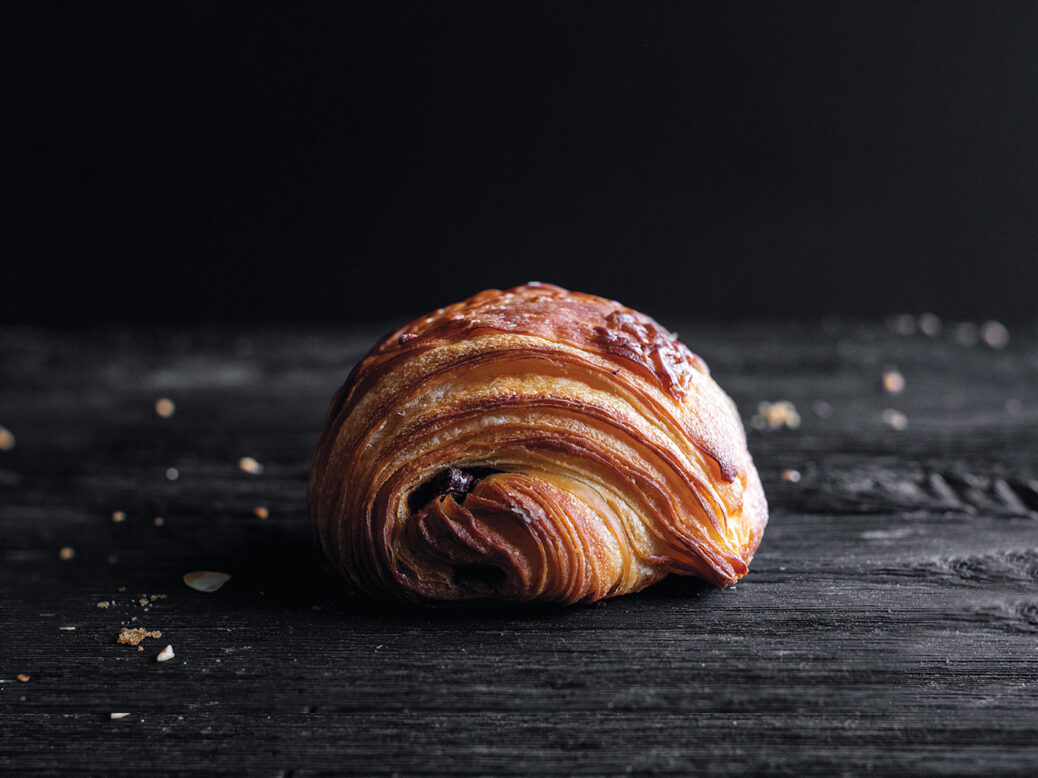
It’s 4.30am on a Friday in August and beneath a sky streaked with dawn, the only ones awake seem to be me, pedalling sleepily through the empty streets, and the foxes who own them at this time of day. Just two things can prise me out of bed this early; travel and food, and this morning’s motivation is croissant-shaped. In June my friend Dan Richards, who is researching a book about the night, enlisted me in a plan to visit the people who get up at silly o’clock to bake our daily bread. And so here we are, dodging the delivery riders already waiting outside McDonald’s, heading down a rutted alleyway towards the sweet, buttery scent of warm patisserie.
On weekends the queue starts forming outside the Dusty Knuckle in Dalston, east London, before they’ve even cranked up the coffee machine. But today, three hours before opening, the bakery is still calm. Someone at the back, hidden behind racks of cooling loaves, is singing the refrain from the Kaiser Chiefs’ “Ruby” in a heavy Italian accent as other staff wander in, still unclipping their bike helmets. A pigeon follows and is swiftly ejected.
[See also: Even when all is gloomy, you can never be too jaded for jelly]
When she arrives, our guide, Daisy Terry, Dusty Knuckle’s co-owner, explains that the bakery now shuts down from 1-5am: “I used to work nights and it drove me absolutely crazy,” she says (before admitting that, at the time, she loved it). Their process is structured around the need to save energy and get more sleep, because “it’s hard physical work baking… And if you can’t pay really high wages, you may as well make it a nice place to be.”
It’s a two-way street: Daisy believes the quality of the bread is “totally dependent on the mood in the bakery. They all laugh at me, but it’s why we have music on in here, and do good staff meals.” Fortnightly massages and rooftop yoga are also mentioned. We are, as I said, in east London.
Yet even within this toasty-smelling bubble, the future is uncertain. Daisy gestures towards Jack, who is wrapping a thick yellow tile in a piece of dough the size of a beach towel, and informs us that we’re looking at £15’s worth of Somerset butter. Expensive, “but I felt we should be using British ingredients… And also I think it’s better.” But the price of both butter and flour have gone up substantially, and – as with energy (which, needless to say, bakers use a lot of) – will rise again before the year is out. Wages will have to increase too for the staff the bakery has managed to hang on to following the double whammy of Brexit and Covid. She sighs. “It’s just going to be a really, really hard time.”
[See also: Saving money in the kitchen is about more than just ingredients]
Perhaps you’re not too bothered by the fortunes of a small London business with celebrity fans including Nigella Lawson (“No friend of mine who lives near the bakery is allowed to step foot in my house without bringing me a loaf of their potato sourdough”), when many, both locally and nationally, are struggling to afford white sliced. But, putting aside the question of why we value bread so little in this country, Dusty Knuckle employs 80 people, some of whom would have struggled to find work elsewhere.
Thanks to co-founder Max Tobin’s background in youth protection, Dusty Knuckle was set up in 2014 in part to offer training and job opportunities to young people at risk of – or who have experienced – a custodial sentence. Eight years later, Daisy laughs that she spends half her life on the phone to oven engineers, and the other half on the phone to probation officers. But she’s clear everyone benefits from the diversity of experience these employees bring to the working environment.
Scores of such social enterprise food businesses exist around the country, from Edinburgh’s Broomhouse Hub Cafe to Carmarthenshire’s Swperbox, where those who can afford the luxury of choice spend their money to help those who can’t. In the difficult months to come, please don’t forget them.
Oh, and I got my croissant, still warm from the oven. As I tucked in, I saw a fox watching me narrowly through the glass. It seems not all early birds catch the worm after all.
[See also: Over time, humans have eaten 6,000 plant species. Now, we eat just nine]
This article appears in the 31 Aug 2022 issue of the New Statesman, The Liz Truss Doctrine



